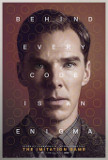Imitation Game, The (UK/USA, 2014)
December 17, 2014
We as a society tear down what we do not understand. We vilify and destroy people who are "different" because their differences make us uncomfortable. That message more than any other rings clear in the account of the life of Alan Turing (Benedict Cumberbatch) as brought to the screen by director Morten Tyldum (Headhunters). No matter that Turing was the key player in the cracking of the German Enigma code and that his work may have ended WW2 as much as two years earlier, thereby saving countless lives. Turing was reclusive, antisocial, and a homosexual and those so-called "black marks" on his character led him to be rejected, prosecuted, and hounded to the point where he took his own life. It's easy to see The Imitation Game as a triumph - after all, Turing accomplished what all the experts claimed was impossible - but it's equally apparent that underlying the triumph is a tragedy. The optimism of Turing's creed - "Sometimes it is the people no one imagines anything of who do the things that no one can imagine" - is counterbalanced by the ugliness of how it all ended for him.
The Imitation Game provides glimpses into three periods of Turing's life as a means of fleshing out aspects of his character. A majority of the running time is devoted to his years at Bletchley Park, where he worked as a codebreaker seeking to undermine the German Enigma. The success of his efforts provided the Allies with full access to all secret German war transmissions. As part of a small group of experts that included Hugh Alexander (Matthew Goode), Joan Clarke (Kiera Knightley), John Cairncross (Allen Leach), and Peter Hilton (Matthew Beard), Turing served two masters: the military commander, Denniston (Charles Dance), and the man from MI6, Stewart Menzies (Mark Strong). The 1939-1945 scenes are presented in flashback using a framing device from 1952 after Turing was arrested for "gross indecency." (He was eventually convicted of the charge and elected to be chemically castrated rather than go to jail.) Finally, there are more distant flashbacks from the late 1920s that depict Turing (played in these sequences by Alex Lawther) as a bullied student who is beginning to recognize his sexuality and experiencing his first crush.
Benedict Cumberbatch's performance as Turing is spot-on, capturing the obsessive need that defines many great minds facing a monumental challenge. Cumberbatch doesn't portray Turing as a likeable or sympathetic character; his approach is very much "warts and all." Turing is cold and awkward around others (the movie finds some comedy in a sequence when he makes a clumsy attempt to win over his compatriots) and more comfortable working with his machine (dubbed "Christopher") than with the four humans on his team. Through Cumberbatch's interpretation, we see the brilliance, arrogance, loneliness, and self-imposed isolation of one of the Allies' most unsung war heroes.
The Imitation Game wisely doesn't attempt to provide a detailed explanation of Turing's work. To do so would have forced the movie down a rabbit hole where only the most technically savvy viewers could have followed. Instead, it relies on generalizations, the most important of which is that "Christopher" represents an early prototype of machines that would eventually become known as "computers." (ENIAC, the first electronic general-purpose computer, was based on Turing's design.) Instead of using valuable screen time detailing mathematical/engineering problems and solutions, The Imitation Game concentrates on the interpersonal relationships among the team members and how the four men and one woman interact with their superiors.
At one point during the film, Turing and his fellows are faced with an impossible dilemma. One of the first things they learn upon breaking Enigma is that the Germans are massing their U-Boats for an attack on an Allied convoy. The choice faced by those at Bletchley is simple: inform the military of their findings and save the convoy (thereby tipping off the Germans that Engima has been compromised) or sequester the information so the font of information isn't cut off. Decoding the Enigma messages becomes as much about what to act upon as discerning the truth.
The Imitation Game is a war movie where no battlefields are shown and no guns are fired. It illustrates the important concept that, even in the 1940s, scientists, engineers, and mathematicians fought on a hidden front that eventually changed the tide of battle. Like Robert Oppenheimer, the "father of the atomic bomb", Turing faced moral predicaments associated with his role. In the end, however, the genius behind all the innovations of Bletchley was destroyed by the pettiness of a society that didn't understand him. The Imitation Game doesn't hide this dark aspect and it makes the production sobering and engrossing.
Imitation Game, The (UK/USA, 2014)
Cast: Mark Strong, Charles Dance, Keira Knightley, Matthew Goode, Benedict Cumberbatch, Matthew Beard, Allen Leech
Home Release Date: 2015-03-31
Screenplay: Graham Moore, based on the book
Cinematography: Oscar Faura
Music: Alexandre Desplat
U.S. Distributor: The Weinstein Company
U.S. Release Date: 2014-11-28
MPAA Rating: "PG-13" (Profanity, Sexual Content)
Genre: DRAMA
Subtitles: none
Theatrical Aspect Ratio: 2.35:1
- Atonement (2007)
- Pride & Prejudice (2005)
- Pirates of the Caribbean: The Curse of the Black Pearl (2003)

Comments